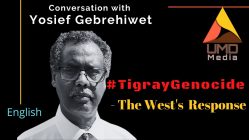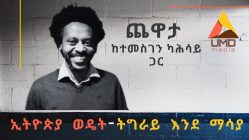Major General Teklebrhan W/Aregay (PhD)
July 24, 2024
Introduction
Tigrayan national interests must be paramount in Tigrayan politics. Peacebuilding is currently a top national interest, necessitating a clear strategy for this crucial nation-building process. Understanding peacebuilding and identifying its obstacles is essential. Peacebuilding forces must organize and overcome trigger-happy elements. This article focuses on peacebuilding and countering elements undermining peace, highlighting these elements, their potential motives, and countermeasures.
Why Peacebuilding is Tigray’s Top Priority
Tigray has endured a cyclical history of genocidal war, culminating in a precarious survival situation. The Pretoria agreement exemplifies this dire reality. Tigray’s survival is attributed to the people’s perseverance and Western intervention, particularly the USA. Leveraging the peace agreement to transform paradigms and beliefs into a peacebuilding agenda is crucial.
Peacebuilding, as articulated by Peter Wallensteen, a Swedish Senior Professor of Peace and Conflict Research and author of numerous books including Quality Peace: Peacebuilding, Victory, and World Order (2015), Understanding Quality Peace (2018) and Understanding Conflict Resolution (2019) encompasses conflict prevention, resolution, post-conflict reconciliation, societal reconstruction, and the promotion of justice and human rights. Essentially, it’s about transitioning from a culture of conflict to one of peace. Sustaining peace requires reflecting on the past, drawing lessons, and prioritizing strategic interests. Peaceful means, rather than conflict, should be employed to achieve goals and reinvent values.
Tigray lacks the paradigms, beliefs, and skills for peacebuilding. Past reliance on conflict cannot compensate for deficiencies in politics, economy, diplomacy, knowledge, and other power instruments. Breaking the cycle of violence necessitates addressing root causes. While acknowledging externally imposed wars and the complex nature of conflict, Tigray must focus on self-improvement. Lessons must be learned from past mistakes, and fundamental changes in thinking, culture, behavior, and activities are essential. A change agency and agents for peacebuilding are needed, but currently lacking in most cases.
Two opposing forces are observed: those learning from the past and striving for change, and truculent elements driving Tigray towards another conflict cycle.
Who Are the Bellicose Elements?
These elements can be categorized as insiders and outsiders. Insiders include elites seeking war in the name of dignity, those desiring revenge for the genocidal war, and those benefiting from the status quo. They often justify war with the poor performance of the Pretoria agreement, compromised territorial integrity, and the occupation of Western Tigray. They label the signers of the Pretoria Agreement as traitors and allies of the Prosperity Party.
Potential insider elements include:
– TPLF hardliners seeking power restoration
– A few military personnel
– Traders, contraband smugglers, and mineral extractors
– Cadres interested in maintaining the status quo
– Irresponsible diaspora elites
– Confused individuals
Outsider elements include:
– Entities with vested interests in war
– Those viewing the Pretoria agreement as a loss
– Those seeking to dismantle TPLF’s stronghold
Their motives include shame, revenge, fear of accountability, economic benefits, power control, wrong perceptions, deception, sabotage, bargaining power, and miscalculations of power balance.
Insiders primarily target the Prosperity Party, might consider to collaborate with Eritrean and Fano forces to dismantle its power and establish a new government. Outsiders seek TPLF’s demise through internal division and scapegoating. However, Fano’s main goal is the complete subjugation of Tigray, while Eritrea aims for a fragmented and weak Tigray to bolster Eritrean nationalism. Tigray’s current weakness prevents it from bargaining through violence, and TPLF cannot be eliminated by outsiders without creating further chaos. The elimination of the TPLF by external forces is likely to exacerbate chaos rather than resolve it. This does not imply endorsement of the TPLF’s current role. Ultimately, it is the responsibility of the Tigrayan people to determine the TPLF’s future through reform or removal from Tigrayan politics.
Tigray’s National Interests and the Way Forward
Tigray’s national interests include peacebuilding, healing, sovereignty, accountability for war crimes, nation-building, breaking from the past, and building national, regional, and global alliances. International actors prioritize Ethiopia’s territorial integrity, regional stability, and Tigray’s constructive role in the region.
If those who perceive themselves as losing from peace prevail, the region will face an unstoppable crisis and bloodshed, the public will suffer immense casualties, the economy will collapse, and Tigray will be isolated from the international community.
To prevent this, Tigray must focus on long-term national interests, building on its existing anti-war critical mass, build peaceful alliances, pushing for the full implementation of the Pretoria agreement as a foundation for nation-building, ensuring rule of law and accountability, exposing and isolating bellicose elements, and establishing a meritocratic government.
Tigray is at a critical juncture. Choosing between peacebuilding and war will determine its future. By understanding the motivations of warlike elements and prioritizing national interests, Tigray can embark on a path towards lasting peace, stability, and advancement.
Editor’s Note: The opinions expressed in the articles published on UMD Media are solely those of the individual authors and do not necessarily reflect the views or opinions of the editorial team or UMD Media as an organization. The publication of any opinion piece does not imply endorsement or agreement by UMD Media. Readers are encouraged to critically evaluate the content and form their own conclusions. Leave your comments below. Send us your thoughts and reflections to umd.media.2020 at gmail dot com.
Guidelines for contributors All contributions and comments submitted to UMD Media must adhere to the following guidelines. Respectful Language: Avoid using ethnic adjectives that generalize or portray an entire ethnic group in a negative light. Such language is harmful, divisive, and contrary to our commitment to fostering a respectful and inclusive environment. No Incitement: Content that incites hatred, violence, or discrimination against any individual or group based on ethnicity, race, religion, etc will not be tolerated. Constructive Dialogue: We encourage constructive dialogue and the sharing of diverse perspectives. However, it is essential to express opinions in a manner that respects the dignity and humanity of all individuals and groups. Moderation and Enforcement: Our editorial team reserves the right to moderate and, if necessary, remove any content that violates these guidelines. Repeat offenders may be subject to account suspension or banning. By contributing to our platform, you agree to abide by these guidelines and help us maintain a respectful and inclusive community.
Subscribe to UMD Media channel. Join UMD Media Telegram Channel: https://t.me/UMDMedia



